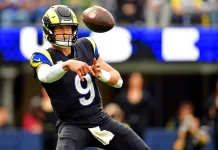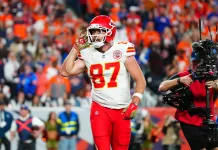Michael Lombardi: Why the Colts can’t win:
As we start the 2024 season, so much has changed for most teams, yet so much has stayed the same. We happily welcomed the NFL back. Naturally, some bets cashed, some didn’t, and the lessons learned from all the games can only benefit us for next week. One major learning experience occurred in Indianapolis. However, what we learned isn’t new. It’s the same old story. The Colts can’t win with their defense under Gus Bradley’s direction.
Bradley is a high-energy coach with a wonderful, upbeat personality, and he is easy for the organization to work with when it comes to adding talent. His kindness and charming personality make the Colts’ decision-makers overlook the flaws of his scheme. His basic scheme allows young players to play without overthinking, and therein lies the problem. His scheme is too basic, simple, and easy to attack. It provides the quarterback with too many easy throws. It never takes away the other team’s best players.
For example, wide receiver Nico Collins was a Colts killer last year. Lo and behold, he was a Colts killer again in Week 1. How can that happen? How can Bradley spend the entire off-season knowing Collins was a problem and not have an answer? Great coaches always think players, not scheme, but not the Colts, they run their basic scheme and place the responsibility on the players to excel. When the matchups favor the Colts, they look better. When they don’t, there aren’t any adjustments Bradley has on his playlist.
For the record, this hasn’t been a new story. Last year, the Colts finished 28th in points allowed and 24th overall. In 2022, the same thing—28th in points allowed and 15th overall. When the Colts hired Shane Steichen as their head coach, he was told he had to keep Bradley, because the front office and ownership loved him. For Steichen, this wasn’t a problem. He and Bradley are best friends outside of football. Once again, Bradley’s friendly demeanor and personality keeps people looking at his defensive acumen.
Steichen has clearly demonstrated he is a great playcaller and offensive game planner. He is on par with Kyle Shanahan in terms of scheming a run game and finding ways to get receivers wide-open down the field. What he was able to accomplish in the 43 plays with the Colts offense was magnificent. Had the Colts gotten any help at all from Bradley and his call sheet, they beat the Texans and could win the South.
I know it’s only one game, and for some, it might be too early to pick Bradley, yet this analysis is based on a two-year sample size. The Colts’ lack of defense isn’t a one-time fender bender but a pattern of poor play that should force head coach Steichen to question his defensive coordinator. This ability to question can only occur if he removes the friendship bond from his evaluation. Matt LaFleur in Green Bay was best friends with his defensive coordinator Joe Barry, which clouded his judgment and cost the Packers wins. Eventually, LaFleur had to make a move. But it was a year too late, which appears to be the same path Steichen is proceeding.
Steichen serves as the offensive coordinator of the team, but he is also the head coach. And with that title comes responsibility. Steichen has an obligation to be objective and not let friendships cloud his judgments. He is the leader of the entire team, which means he needs to make tough and sometimes unpopular decisions. As the great leader Corrado Junior Soprano once said, “That’s what being a boss is. You steer the ship the best way you know. Sometimes it’s smooth. Sometimes, you hit the rocks. In the meantime, you find your pleasures where you can.”
Steichen has hit the rocks, and even though he can find pleasure in Anthony Richardson’s immense talent, he has to lead the team and demand more from Bradley—more scheme, more adjustments, more ways to help the players. When the scheme is so simple, it allows the coach to blame the players when things go wrong.
On long runs, coaches will say, we didn’t hold our gaps, or on big pass plays, we didn’t make a play on the ball—which is true. However, it’s a coach’s job to give the players a slight edge, to help them with plays calls, understanding what the offense wants to accomplish. A playcaller on defense is as important as a playcaller on offense. When a call creates a negative play, forcing the offense to play from a disadvantage, the defense can seize the moment. This doesn’t happen in Indy.
When the Colts create a negative play, their next call is a soft zone, allowing the quarterback to make an easy throw. Bradley operates this way, believing the pressure from his defensive line will win. That sounds great in theory, but it doesn’t happen all the time. The Colts had four sacks in the game, and they still allowed 417 yards of offense. In the 10 possessions the Texans had, they only punted twice, with one of them being blocked. They scored on every other drive, not counting the end of the half.
Playing at home, the Colts never stopped the run and never forced the Texans to be uncomfortable, even at the end of the game. When they needed the ball back on 3rd and 9, they failed to make a play. Yes, the Colts lack talent in the secondary, which is a problem. They also lack answers. Bradley is playing checkers in a game that requires a chess master. Whenever he faces a great offensive mind, don’t bet the Colts, no matter how good Richardson might look.
Steichen knew this last year; he chose to defend his friend. ==He violated the Godfather creed, letting family interfere with business. Now he is stuck. And all he can do is try to convince Bradley to become a chess player—which we know won’t happen.
My advice is to stay away from the Colts, except for Overs.
For more thoughts from Michael Lombardi, here’s what he had to say about Jets on The Morning Line.






